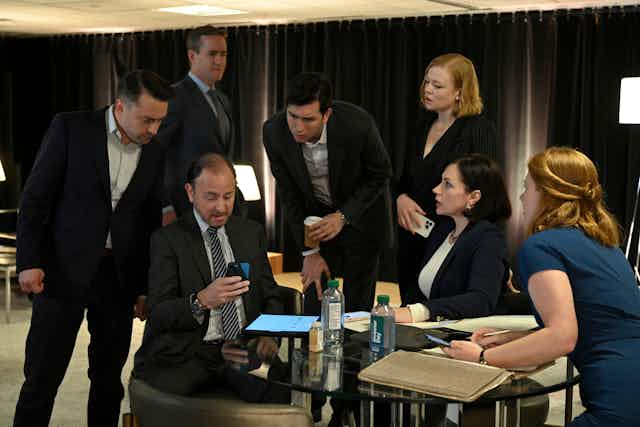Iconic television shows share unforgettable title sequences that have lived on as sonic calling cards we can quickly identify.
The television show’s opening sequence has artfully evolved from the memorable tunes of bygone radio formats into an expositional bookmark that sets the tone of what’s coming in a series.
For the viewer, the opening titles draw us into a narrative world.
As a professional media composer of more than 20 years and a screen composition lecturer, I unapologetically love, tolerate or mute opening title music.
Now, at the end of its final fourth season, I hold Succession’s theme in regard.
From the first frame, it is clear craft and imagination are deeply valued throughout the show’s entire soundtrack.
Another member of the family
Accompanying the grainy “family videos” feel of the Succession’s opening visuals you’ll hear a late 19th-century-style piano piece. This is accompanied with a contrasting melody that sometimes accents dissonant notes in the theme.
Composer Nicholas Britell describes this music as off-kilter, “like the family in the show”.
A New York classic hip hop drum machine beat anchors the melody’s chaotic, dissonant touches, suggesting something underhand with a touch of gangster.
Britell’s 20 years working in hip-hop production and film scoring are clear with his blend of hip-hop beats and classical orchestration.
Britell’s work echoes the mix of hip-hop beats and art music in Malcolm McLaren’s 1984 song Madam Butterfly, which left a hypnotic legacy of a constant, raw hip-hop beat underpinning an irresistible melody. Bands like Run DMC and The Beastie Boys took their audio sampling cues from McLaren’s work, and now Britell seamlessly blends these two worlds in a television format.
Broadening the instrumentation to incorporate the gravitas and lyrical timbre of strings captures the show’s themes of intrigue in the corporate media establishment.
Repeating string sequences – reminiscent of Philip Glass’s use of layered musical sequences – build intensity and allude to the turning wheels of industry.
When the strings shift into a distinctive classical form, they remind us of the show’s grand setting of this drama. Then the dissonant piano jolts us back into the court, with the jester weaving chaos.
Succession’s opening titles are a unique fusion of musical duality that embody elements of absurdity with a more profound gravitas.
Read more: Kendall Roy's playlist: why hip hop is the perfect counterpoint for Succession’s entitled plutocrats
Scoring the show
Britell’s describes the collaborative process of finding the sound of Succession stemming from an early conversation with producer Adam McKay and the show’s creator, Jesse Armstrong, from which a chord progression “that felt very, very 1700s” emerged.
The sound of the show echoes off the sound of the opening credits through the main theme melody appearing as variations throughout each episode.
Throughout the series, Britell’s compositional scope has musically realised scathing satire and moments of poignant emotional pull with an empathic connection which has had me, at times, in tears.
In other moments, the score suggests absurd dark humour via overblown and pompous orchestration.
Throughout each season, the soundtrack has played with different instrumental blends and subtle harmonic changes to underscore an extensive range of emotional narratives.
In season one, you might notice an experimental electric piece that could appear on a compilation with post-punk British bassist Jah Wobble.
In season two, you could hear a Mozart-like lightness of touch.
Britell’s constant evolution of minor motifs and variations on the main theme syncs with the shape of the storyline.
The opening theme is woven through so many intimate and epic moments. There is Logan Roy’s outburst over his perceived children’s failings. When there’s underhand corporate intrigue at hand, the score uses the theme to allude to the dark machinations of the show’s corporate narrative.
The instrumentation and arrangement of Succession’s soundtrack nod to the Baroque and Classical symphonic movements, and the conceptually driven work of the Russian Romantic composer Sergei Rachmaninoff (1873-1943).
Britell’s Serenade in E flat or Impromptu No. 1 in C minor could sit comfortably sit comfortably beside works such as Mozart’s Fantasia in C minor (K. 475) or Schubert’s 4 Impromptus, Op. 90, D.899: No 1 in C Minor.
Succession’s soundtrack has elevated the compositional benchmark that seeks to evolve television soundtracks into longer works that occupy a more lasting place as future works to perform.
As a lover and composer of both art music and beat driven electronic music, I have thoroughly enjoyed Britell’s score for Succession.
I’ll miss the show for how the music has brought its own life force to interact with the narrative to deepen the viewer’s experience.

